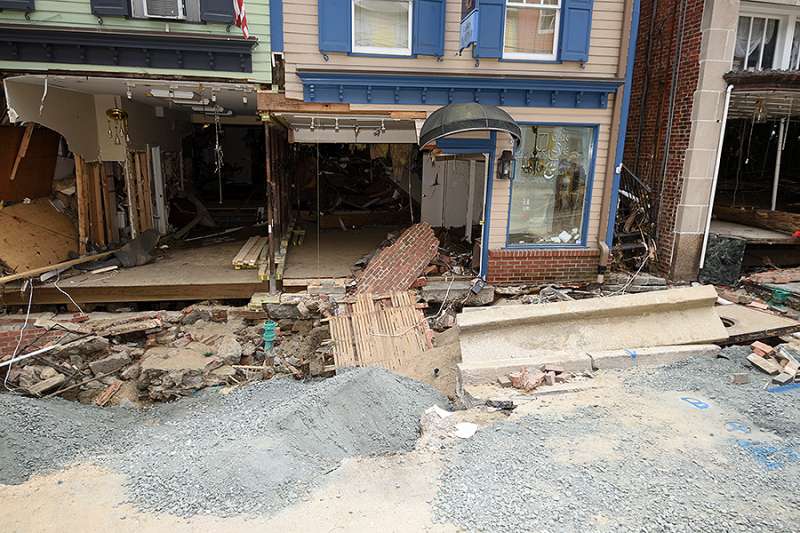Perched on a hill overlooking the rivers and railroad tracks in Ellicott City, Maryland, stands St. Paul’s Catholic Church — a place where many Catholics in the Archdiocese of Baltimore go to pray.
Since a devastating flood hit the city over Memorial Day weekend, the church has also been used as a safe haven for victims of the deluge and a hub of service for those in need.
“Fr. Warren was here when the flooding happened,” said Deacon George Krause of St. Paul’s, who told CNA that when the flooding started May 27, the church was “the first place that people headed,” because of its high location on the hill.
“Fr. Warren was able to open up the buildings here and the church to let people in from the rain and gave them the opportunity to make phone calls and make arrangements with loved ones and things like that,” Krause said.
Fr. Warren Tanghe is the pastor of St. Paul Catholic Church, which became a center of service to Ellicott City during the recent flooding.
According to Krause, St. Paul’s was “the first hub of the Catholic faith to reach out and pray for everyone that was impacted” during the flood. He also noted the Knights of Columbus members of St. Paul’s were providing meals to the first responders and police officers in the days following the flood.
On May 27, the Baltimore area was hit with severe thunderstorms which soon turned into flood warnings. Ellicott City, just 13 miles west of downtown Baltimore, was hit the worst, as the water in the streets began to rise throughout the course of the day, reaching its peak near 6:00 in the evening. At this time, water was rushing down main street, destroying cars and stores along its path.
One man, National Guard Sgt. Eddison Hermond, was killed by the flood’s raging waters as he tried to help a local pet store owner. A similar flood had hit Ellicott City in 2016, and many of the city’s residents are still recovering from the first deluge, which killed two people.
Ellicott City is a historic cultural center located in Howard’s County between Baltimore and Washington, most of which sits alongside creeks and below towering hills. While some blame the rising river as a contributor to the flooding, the most recent floods were caused by water rushing in from above.
As many residents are beginning to re-start their lives in the aftermath of the flood, Krause said St. Paul’s continues to serve those impacted by the storm in their community. He noted the parish is currently collecting cleaning supplies for shop owners, as well as money donations to help with damages.
In addition, the church offered their parking lot to Baltimore Gas and Electric crews as a command center in the weeks following the flood, which was used to address gas leaks and power outages throughout the city. The church’s parking lot is also currently being used by shop owners who park their cars on the hill and are escorted by police down to their stores.
“We are just here to help and provide,” Krause said.
Fr. Warren additionally told the Baltimore Catholic Review the weeks following the flood would be primarily focused on accompanying victims with their grief and sense of loss.
On the eve of the feast of Corpus Christi, Archbishop William Lori of Baltimore visited St. Paul’s in an effort to offer the community prayers and support as they deal with the damages of the flood.
“I came today just to be with you, to pray with you, to offer you a word of love and encouragement, and in this difficult time, to remind you of the abiding presence of the Lord in our midst,” said Archbishop Lori in his June 2 homily.
“A principal message of today’s feast might be summed up in this way: as Jesus is present to us in the Eucharist, so we need to be present to those in need,” Lori continued.
In an effort to comfort those impacted by the storm, the Baltimore archbishop encouraged those gathered to lean on each other during tragic times and to sacrifice themselves for others. He particularly pointed to the presence of Christ in the Eucharist as a way to gain strength and grace during difficult times.
“That is the key to rebuilding not merely our town, but indeed our very lives,” Lori said.
“So let the Lord’s Eucharistic presence make us more present to one another and may his sacrificial love — his body and his blood given out of love for us — enable us, even in the most trying of times, to give of ourselves to others.”

